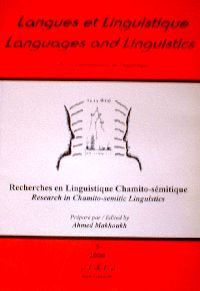Edited by : Ahmed Makhoukh
2000 / Issue 5

Ahmed Makhoukh Abdeljalil El-Idrissi Ahmed Makhoukh Haseeb Shehadeh G. Kitula King'ei N. Mcbeath Moha Ennaji
Introduction
Verbes Supports et Supports … Lien en Arabe Marocain
WH-Agreement in Standard Arabic
The Influence of Arabic on Modern Hebrew
A Descriptive Study of Arabic Loan Words in Kiswahili
Rebuilding a Nation: Language Policy in the Sultanate of Oman since 1970
The Issue of Arabisation in the Moroccan Educational System
| Compte-rendu / Book review (in Arabic) | |
|
Fouad Saa Principes d'Orthographe Berbère By Mohamed Elmedlaoui |
|